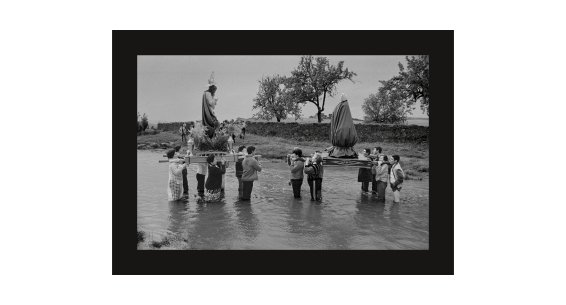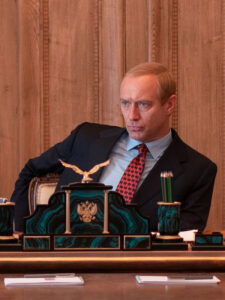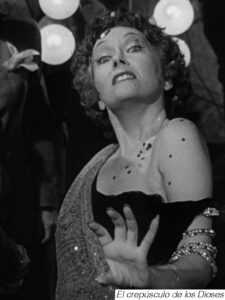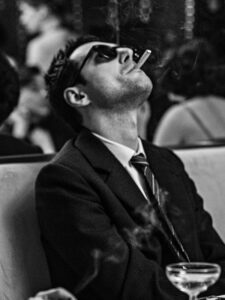
Original title: First Reformed · Paul Schrader · USA · 2017 · Script: Paul Schrader · Interpreters: Ethan Hawke, Amanda Seyfried, Cedric Antonio Kyles, Michael Gaston…
Both in his role as director and in his most recognized work as a screenwriter, The filmography of the American Paul Schrader has explored, over the decades, all corners of your country's culture. There are very debatable titles in his resume and works that are part of the best in the history of cinema. (His are titles as memorable as Taxi driver, wild bull, Mishima, American Gigolo oThe last temptation of Christ). I think we are not wrong if we say that The reverend, his latest production behind the camera, is among the latter.
Of The reverend we can praise many things, starting, of course, for the script, in hands, again, from Schrader himself. A piece perfectly crafted by this great storyteller whose limits he manages to masterfully control., despite, even, of certain apparent licenses or extravagances. Here we find the Reverend Ernst Toller, a forty-something priest in charge of a small congregation who is tormented by the loss of his son in the Iraq war. One day, one of his young parishioners asks for his help with a personal problem. her husband, an environmental activist with strong convictions, You have serious doubts about the birth of your next child. Is it responsible to bring a child into a world that is breaking down??, he wonders. Toller tries to help the couple by convincing the future father with solid arguments. However, The reasons given by the young man will make a dent in his already weak conviction.

The vicissitudes of this tormented parish priest open the door to the director of Afflictionto address some issues of interest to you. Schrader does not leave a puppet with a head. His darts aim, of course, to a system that, in environmental terms, is leaving the world a mess. Pollution threatens to destroy the planet. Contamination of the physical environment that will continue in moral contamination, reflected, For example, in the lack of principles of a church more concerned with supporting business than assuming responsibilities to safeguard Creation. Corruption, in turn, of the economy, represented by an ambitious local businessman with interests in the energy industry who, (oh, perfidious coincidence), financially supports the religious congregation while, by the way, try to put at bay, justify, his own bad conscience. Pollution, definitely, of a society more interested in keeping up appearances than in facing the problems that truly afflict it. Bright, in this case, the sequence in which Reverend Toller (magnificent Ethan Hawke in one of the best roles of his career) must lead a therapy group. Far from the pulpit and the melodic voices of the choir, when real conflicts arise, These are buried under the brightness and appearance of happiness that those ultimately responsible for the congregation try to convey.. Faced with the conformism of the hierarchical leadership, Toller has decided to commit, get your hands dirty, assume, to the last rational consequences, the divine command.
These starting elements serve Schrader to create dialogues that show one of the most intelligent and perceptive pens that, today, They travel through the cinematographic world (Yeah, We already know that he will not win any Oscar). The dialect battles between Toller and the young Michael or the well-to-do Reverend Jeffers are, simply, memorable. In the background, the torture of a soul that no longer finds support among its peers on which it can sustain itself. This is the true drama of Reverend Toller. Plagued by guilt and doubt, I couldn't look away.

But perhaps the most beautiful thing about this film is found in the construction of a dramatic structure that goes beyond realism., playing with fantastic elements with which Schrader underpins that poetic accent, symbolic, with which it impregnates the entire tape. As we mentioned last week regarding Madame Hyde, This gives the film that air of creative freedom that exudes in each frame and that passes from the screen to the viewer.. This mix of tones (thriller, social realism, fantastic) results in a very suggestive cocktail. Put on the trail of the main conflict, the viewer is swept away, So, from one end to the other, unable to anticipate where the story will go, happy to be manipulated (y, for once, The term does not imply any pejorative value) with intelligence and sensitivity, as only happens in the great works of cinema. Schrader forces us to accompany his character, stuck to your skin like a shadow, and participate in their dilemmas, get into your mind to be, So, accomplices of his reflections, climbed on an emotional ferris wheel whose arrival is difficult to predict, well it's unexpected, even, for Toller himself.
Again, the scriptwriter of fundamental pieces such as Taxi driverHe shows himself to be a conscientious connoisseur of the depths of the times we are living in.. And the reference to the film that Martin Scorsese would direct is not at all gratuitous.. Like on that occasion, Schrader demonstrates that he has a keen sense of smell to capture the temperature of his country's society. (and we could well extend it to any part of the rusty west). Over there, Schrader and Scorsese took that dark city of New York as a metaphor for the decrepitude of that second half of the seventies., preview of the eighties that would follow. A city of smelly streets where drugs, prostitution and, above all, violence, they roamed freely. A world without law. Today things have changed somewhat, but not as much as you would expect.

Like in Taxi driver, the country that Schrader portrays in The reverendIt is just as lost almost forty years later. And although he has now moved the action to a modest residential neighborhood, the conflicts are very similar. Opportunities are poorly distributed (or there are those who do not have any), and the only consolation is found under the protection of a system that, again, it only seeks to subdue us. Y, at the bottom of it all, as usual, politics is found. Taxi driverIt was the reflection of a precise moment, result of a drama that had produced no plausible benefit: the vietnam war. What was the point of so much sacrifice?? What was the profit of so much death?? If a time of prosperity followed the Second World War, Vietnam ended with a largely negative balance for the country. At the return of the war, Travis, its protagonist, is lost and neglected.
And the situation continues. The Vietnam War was followed by the first Gulf War., with its second part, the infamous Iraq War. Both conflicts devastate, directly or indirectly, el alma del reverendo Toller. Hijo y nieto de militares, el párroco continúa la tradición familiar con funestas consecuencias. So, The reverend se convierte en el reflejo de toda una conciencia nacional. Un país que, como reflexiona Toller, se siente culpable frente a su historia reciente, pero que no quiere afrontar la responsabilidad de las decisiones tomadas. La próxima revolución, la próxima frontera de la resistencia ya no será contra un conflicto bélico, como les sucedió a las generaciones anteriores, sino contra las políticas desaprensivas que el gobierno y el sistema económico ha desatado contra la misma Naturaleza.

El protagonista de The reverendtiene muchas similitudes con el Travis de Taxi Driver. Un hombre solitario, taciturno, que se mantiene al margen de la sociedad. A society to which, in that search for justice, look with absolute contempt. Great, like travis, seeks his own redemption in the salvation of the helpless. On the way, however, walk the path of despair and, why not, of madness. As in Travis, Pastor Toller has very little to lose. Again the cause of a woman will be the object, the excuse, to take your obsessions out for a walk.
Leaving aside the script and any of its possible alternative interpretations, The other pillar on which Paul Schrader's latest work rests is an apparently simple staging, but dazzling in its subtle complexity. Special mention deserves, in this case, the work of cinematographer Alexander Dynan, responsible for Schrader's previous work, like wild dogs.The play of light and shadow of the interiors together with the wise management of exteriors from which Dynan knows how to extract impeccable profits (that dying sky that covers the small congregation), They collaborate masterfully to underpin the tone of dark melancholy that interested the plot., reflection of the events that occur, mirror of the deep sadness in which the characters swim.
But, beyond all this, There is the precision in the composition of the shots and the time management that Paul Schrader displays in this superb film. Schrader rolls in a beautiful almost square format, an aesthetic decision with which he anchors his story at the height of the human drama that he wants to show us. Schrader fixes the camera to the tripod and, except for some occasion, barely let it move. Inside the frame, everything happens at a pace that seems as if it were suffering some kind of delay, as if the director himself had deliberately set out to retain it by opening a small space, a gap, between each gesture, each sentence, between one plane and the one that follows it. It should be noted that The reverend It is not a movie of fast and violent actions, as shown by a good part of the director's cinema. Here the time of the narration is the time of reflection of its protagonist. And when the camera moves, at last, of the axis to which it has been fixed, The film touches the essence of that God after whom they are lurking, not only this afflicted priest, sino, somehow, all the characters. Or better, what can be divine in the human: love. Don't miss it. GERARDO LEON










